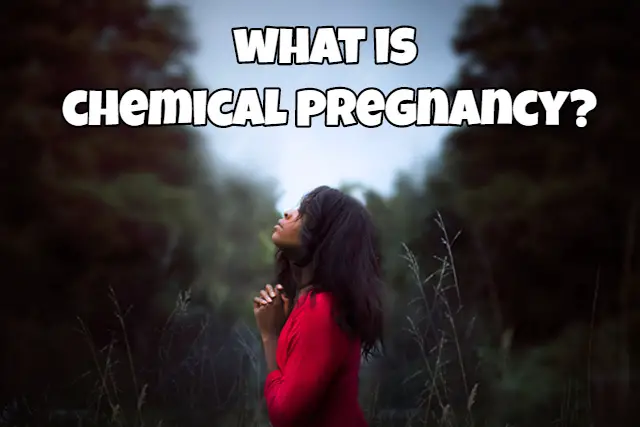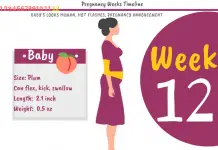Terms related to pregnancy can be easily understood if you break them down. Chemical pregnancy means it is only restricted to chemical symptoms.
Many conceived pregnancies end in a miscarriage. First trimester miscarriages are due to chromosomal abnormalities. Most women don’t even come to know that they had a miscarriage.
A chemical pregnancy is also roughly speaking a miscarriage. It is an unviable pregnancy and spontaneously terminates before the 20th week of gestation.
About 50-75% miscarriages are because of chemical pregnancies. It is because early pregnancy symptoms have similarities with PMS.
Also, most chemical pregnancies terminate within a week after implantation. It is the time for a period.
Doctors do prenatal ultrasound only after the sixth week of pregnancy. By this time nothing is present in the uterus, and thus it is a miscarriage.

What is a chemical pregnancy?
It is a spontaneous miscarriage before the 20th week of gestation. It is only the chemical present in the body that indicates pregnancy. Otherwise, there are no symptoms of pregnancy. That’s is how it gets its name.
Chemical pregnancy symptoms
The signs and symptoms are unnoticeable since it is a non-viable pregnancy. The signs are not distinctive from a miscarriage. Mostly a woman never comes to know that she is chemically pregnant.
What are the signs and symptoms of chemical pregnancy?
- Abdominal Cramps
- Spotting
- Delayed period
- Fatigue
- Nausea
- Heavy headedness
- Low hCG levels
- Heavy blood flow after a positive pregnancy test
Implantation bleeding or chemical pregnancy?
Implantation bleeding is the spotting pregnant woman gets after the embryo attaches to the uterus. It occurs after a week from ovulation.
It generally happens in the third week of the menstrual cycle. Implantation spotting is very light and never goes to the extent of heavy blood flow.
On the other hand, a chemical pregnancy involves a heavy blood flow. It generally occurs near your due period date. It is like menstrual flow.
If chemical pregnancy occurs at a later stage, then the blood flow will be heavier. Another important difference between the two is the hCG levels in blood and urine.
After implantation, the hCG levels go on doubling every 48 hours. After a miscarriage hCG levels won’t rise that rapidly.Also, it may be that chemical pregnancy hCG levels become static and start declining.
Implantation bleeding is like a pinkish discharge but miscarriage is a heavy blood flow.
Is chemical pregnancy normal?
Yes, it is a common occurrence. Most women have a miscarriage during their lifetime. But it is not a normal pregnancy. It is a miscarriage. It is not a viable pregnancy.
What causes a chemical pregnancy?
It is an abnormal pregnancy. There is not a single cause. There are many possible causes:
- Chromosomal defects: Any chromosomal defects will cause abnormalities and lead to miscarriage.
- Hormonal imbalance: Low estrogen levels and fluctuations in other hormones causes chemical pregnancy. It is a result of faulted hormones.
- Luteal phase defect: If your luteal phase is too short, uterine lining will not develop. The estrogen levels won’t rise enough. Thus the pregnancy will spontaneously terminate. Luteal phase defect leads to sloughing of the vaginal lining.
- Illness: If your immune system is weak you will catch infections. Fever and flu can also cause this early termination of pregnancy. You need to be healthy to sustain the pregnancy.
- Thyroid dysfucntion: Hypothyroidism and other thyroid problems can cause miscarriage. Thyroid influences the basal metabolic rate and also cause pregnancy complications.
- Uterine abnormalities: If your womb isn’t of the right shape and size or has weak muscle then you may undergo a miscarriage.
- Fallopian tube blockage: If your tubes have any blocks then your embryo will not travel and implants in the uterus. This will cause extra uterine pregnancy and terminate soon.
- Ectopic pregnancy: Ectopic pregnancy has a miscarriage as its fate.
- Toxoplasmosis: If your body gets exposure to toxins and syndromes like toxoplasmosis then you are at risk of having a miscarriage.
- Hereditary problems: Some people have genetic abnormalities and thus cannot have a normal pregnancy. Their pregnancies end in miscarriages multiple times.
- Age: Woman who conceives after 40 is at a higher risk of chemical pregnancies. The body grows old and reproductive processes take a back seat.
- Smoking: Smoking is a risk factor for infertility. Smoking affects the female body adversely.
- Alcoholism: Drinking too much is another risk factor for infertility. Alcohol affects the fertility and thus is a cause of early miscarriage.
- Drug use during pregnancy: Entertainment or recreational drugs also affect pregnancy. During early pregnancy, they affect the development of the baby and can terminate it.
- Using old embryos for IVF: Infertility therapies using frozen embryos put you at a risk of nonviable pregnancy.
- Weight fluctuations: If you are obese or anorexic then your body will not be able to progress pregnancy normally. Weight problems can cause such complications.
- Clotting problem: If you have blood clotting problems then you are likely to be at risk of miscarriage. After implantation bleeding, you might bleed heavily and have a miscarriage.
- Infections: Women who have infections of the reproductive tract might be at a higher risk of getting chemically pregnant.
- Endometriosis: Endometriosis is the abnormal growth of uterine tissue in other regions. This is a major cause of being chemically pregnant.
- Sexually transmitted diseases: Syphilis and Chlamydia can cause pregnancy complications. Sexually transmitted diseases affect your reproductive abilities. This can cause infertility or miscarriage.
How long does a chemical pregnancy last?
It can last from five to six weeks. Some women might just consider it as a delay of periods but they are actually pregnant.
The signs are not evident and women never know that they had it. It may begin to show normal menstrual symptoms and then bleed away. The blood flow, in this case, will be like a heavy bleeding.
The woman will experience cramping and localized pain near her uterine region. If not early it will last for five weeks at least. And five weeks period delay is enough time to consider taking a pregnancy test.
Earlier women did not have the option of taking a home pregnancy test. Nowadays more women discover chemical pregnancies due to the availability of these tests.
Mostly women grieve thinking that they lost a baby. But factually until five weeks, the embryo doesn’t develop much to be a baby. But the sense of regret and loss is genuine in the case where she already got a positive pregnancy test.
Chemical pregnancy gives a faint positive pregnancy test because of low hCG levels. That is why it is best to consider faint positive pregnancy test as true or sign of other health issues.
Chemical pregnancy hCG levels don’t rise as rapidly as in the case of a healthy pregnancy. It could also be that hCG levels start declining after a point of time.
IVF and chemical pregnancy
Does IVF increase the chance of chemical pregnancy?
There is no evidence to support that woman who undergoes IVF is more prone to chemical pregnancy.
It is important to use fresh embryos for IVF treatment. If your doctor uses frozen embryos, then you are at a slightly higher risk of getting chemical pregnancy. This is because the embryos have aged and may have got mutations.
Age is another factor that can cause chemical pregnancies. Women older than 35 years have a higher risk of miscarriage and a chemical pregnancy.
Older women don’t produce fertile eggs frequently. Once in a while, they may ovulate a defective egg. If this gets fertilized, then it will lead to a chemical pregnancy.
Chemical pregnancy Treatment
There is no treatment for chemical pregnancy. Such a situation arises spontaneously and suddenly, there is no time for treatment. Low levels of hCG are the only detectable sign that can make a vague prediction of a such pregnancy.
- Progesterone and estrogen supplements: Estrogen levels are crucial for forming the uterine lining. Your doctor might give you these supplements to prepare your uterus for pregnancy. It is important that you get a gynecological checkup often to know these problems before getting pregnant.
- Surgical correction of uterine abnormalities: If you have endometriosis or polyps then you need a surgical procedure. A surgery may also be necessary to open any blockages in the fallopian tubes. After fertilization, the egg travels down the tubes. If there is a blockage, it will not move to uterus and implant there itself. This can also be a cause of chemical pregnancy.
- Antibiotics for infections: Infection such as Pelvic inflammatory disease can cause such a pregnancy. In that case before trying to get pregnant next time you need to first treat the infection. Your doctor will prescribe antibiotics or antifungal crèmes to treat infections.
How to prevent Chemical Pregnancy?
Unfortunately, there is no way to predict it. Hence, there is no way to prevent a chemical pregnancy. All you can do is practice safe sex.
- Limit the number of sexual partners.
- Always use a condom while having sex with strangers.
- Do not douch or insert anything into your vagina.
- Avoid taking emergency contraceptives.
- Follow all precaution recommended by your doctor during infertility therapies.
- Maintain a healthy body weight. Don’t go in for crash diet plans.
- Eat a balanced and healthy diet. A healthy diet influences the kind and quality of hormones produced by your body.
- Stop smoking and limit the alcohol consumption to allowed limit.
- Once you decide to get pregnant stop any kind of recreational drugs. Taking drugs during pregnancy is formidable.
When can I get pregnant after chemical pregnancy?
What can you do to have a normal pregnancy after chemical pregnancy? Having a normal pregnancy afterward is not difficult.
You don’t have to do anything different. Just maintain a healthy diet and time your sex. It is important that you figure out your ovulation date and have sex at that time.
There is no evidence that a chemical pregnancy will affect your fertility. You can get pregnant later. But it is best to ask your gynecologist about it.
One needs to wait until the hCG levels completely fall down. This is because a tubal pregnancy can mimic chemical pregnancy.
So there may be cases that a lump of tissue goes on growing inside your uterus.
What can you do after a chemical pregnancy?
Getting pregnant after chemical pregnancy can make you feel scared. Depression is common.
Undoubtedly, losing what you dreamt as your baby can be very painful. Not only emotionally but the physical pain of chemical pregnancy can also make the woman anxious.
There is no shame in taking help. You must talk with your counselor and speak your heart out. You are not alone. Talking to others who have been through the same can help you. Also, keep discussing with your partner.
But don’t be adamant to grieve because life has to go on and the more you dwell the more distant will be happiness!



![First Trimester Of Pregnancy: Weeks 1 To 13 First Trimester [Week 1- Week 13 Overview]](https://www.pregnanteve.com/wp-content/uploads/2019/07/first-trimester-of-pregnancy-218x150.jpg)






Is there a chance it might be a chemical pregnancy if you notice a thicker than usual discharge that is slightly tinged pink ????
i’m 4 weeks 1 day pregnant.
Chemical pregnancy is an abnormal condition. Pink thick discharge occurs when spotting mixes with cervical mucus. Spotting is not a sign of pregnancy complications. Chemical pregnancy is difficult to diagnose merely on presence of thick discharge of pink tinge. Moreover we cannot provide diagnostic answers. Other symptoms include intense cramps, nausea, heartburn, bleeding, irregularity in pregnancy tests etc.
So what do i treat the symptoms? I feel in so much pain . Almost to the point that im going to dye!
Severe cramps and pain with spotting after positive pregnancy test is sign of miscarriage. Consult a doctor. Home remedies include taking rest and keeping your body at a normal temperature.